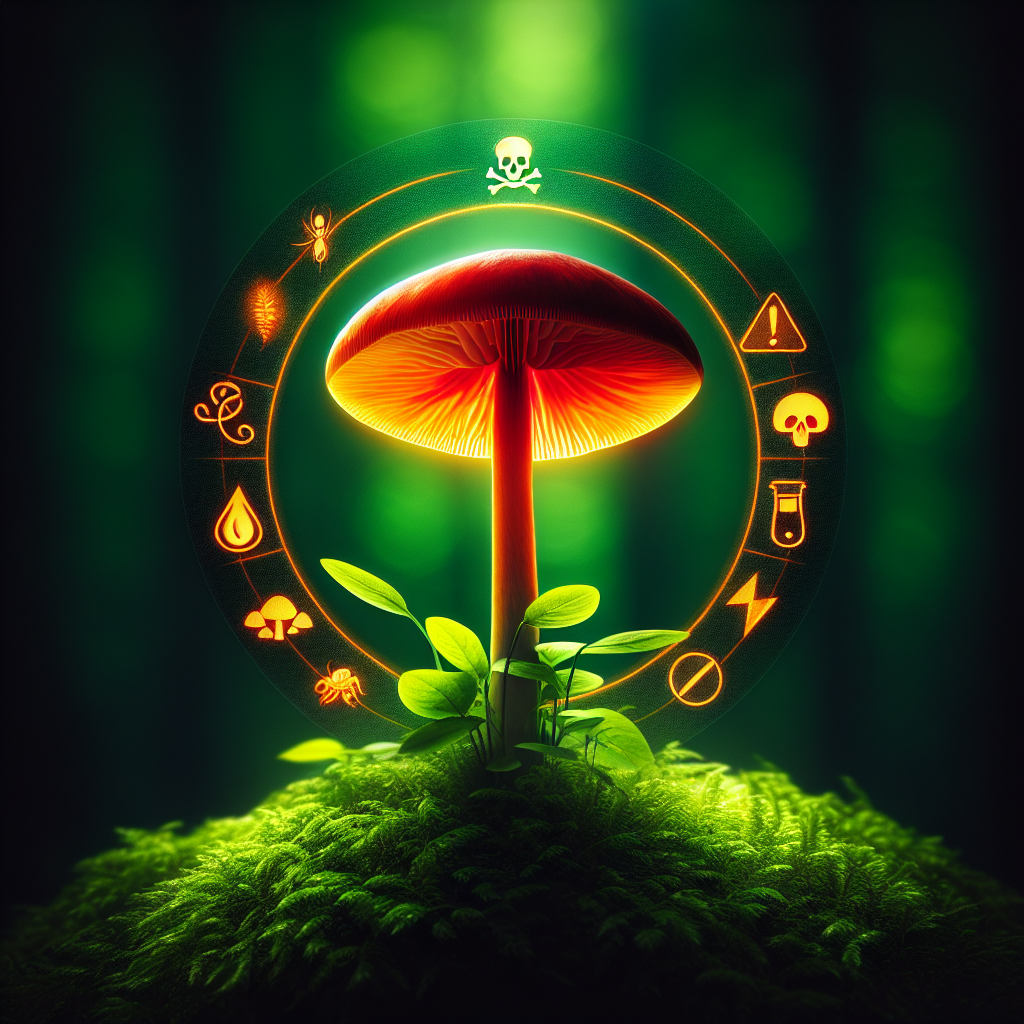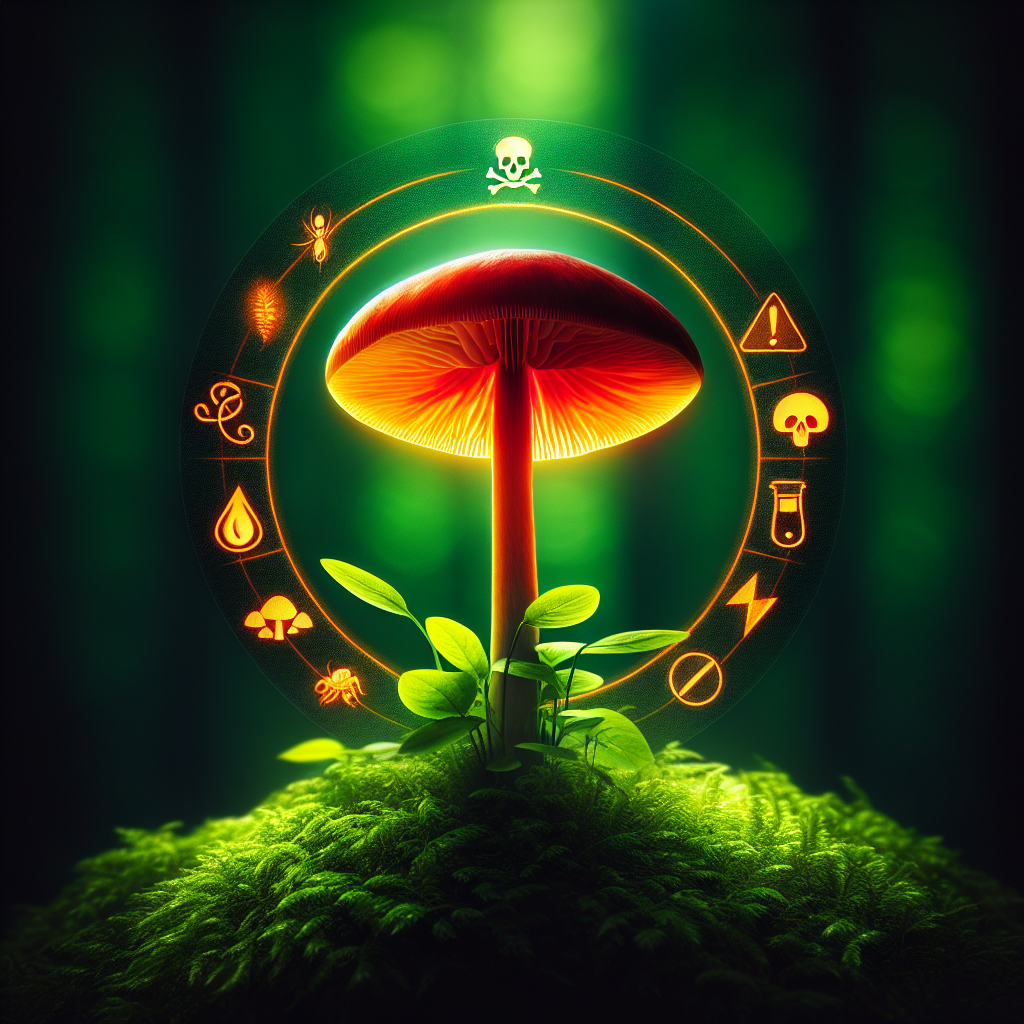If you ever find yourself in the unsettling situation of suspecting mushroom poisoning, it’s important to remain calm and take immediate action. This article aims to provide you with the essential steps to take if you suspect that you or someone you know has consumed toxic mushrooms. By following these guidelines, you can ensure prompt and appropriate medical attention, while minimizing the potential risks associated with mushroom poisoning. With the right knowledge and quick action, you can navigate this potential health concern with confidence and peace of mind.
Seek Immediate Medical Attention
If you suspect that you or someone you know has been poisoned by mushrooms, it is crucial to seek immediate medical attention. Time is of the essence when it comes to mushroom poisoning, as some varieties can lead to severe complications or even be fatal. The first step in seeking medical help is to call emergency services. Explain the situation calmly and provide them with your location details. They will dispatch trained professionals who can provide the necessary help.
In addition to calling emergency services, it is also advisable to contact a poison control center. Poison control centers have highly trained staff who can provide guidance and support during a poisoning incident. They will ask you specific questions about the mushroom and the circumstances surrounding the incident, and they can provide valuable advice tailored to your situation.
Provide Accurate Information
When seeking medical help for mushroom poisoning, it is essential to provide accurate and detailed information to the medical professionals. This will assist them in making an accurate diagnosis and determining the most appropriate course of treatment. Here are some key pieces of information to gather and share:
Identify the Mushroom
If possible, try to identify the mushroom that was ingested. Take note of its color, shape, size, and any distinguishing features. If you have a smartphone or camera available, take clear photos of the mushroom from different angles. This information will help medical professionals identify the exact species of mushroom and determine the potential toxicity.
Note the Time of Ingestion
It is important to remember and communicate the approximate time when the mushroom was ingested. Different mushrooms have varying onset times for symptoms, which can greatly assist in diagnosing the poisoning. By providing this information, medical professionals can better understand the progression of symptoms and apply appropriate treatment promptly.
Describe Symptoms to Medical Professionals
When speaking with medical professionals, be sure to describe all the symptoms that you or the affected person is experiencing. Common symptoms of mushroom poisoning include nausea, vomiting, stomach pain, diarrhea, dizziness, sweating, and difficulty breathing. By providing an accurate account of the symptoms, medical professionals can get a clearer picture of the severity of the poisoning and determine the best course of action.

Do Not Delay Treatment
In cases of mushroom poisoning, it is crucial not to delay treatment. The toxins present in certain mushroom species can cause rapid and severe damage to the body, including liver and kidney failure. Therefore, it is important to follow these guidelines:
Avoid Self-diagnosis
While it may be tempting to search the internet for information and attempt to diagnose the poisoning on your own, it is strongly advised against. Different mushrooms contain different toxins, and the severity of symptoms can vary greatly. Only trained medical professionals can accurately assess the situation and provide appropriate treatment.
Do Not Induce Vomiting Without Medical Advice
While inducing vomiting may seem like a logical step to remove the toxins from the body, it should never be done without medical advice. Some mushroom toxins are more harmful when vomited back up, while others can damage the esophagus or cause aspiration. Instead, follow the guidance of medical professionals who will provide the best course of action for your specific situation.
Prevent Further Poisoning
To prevent further poisoning and ensure the safety of yourself and others, it is important to take immediate action:
Avoid Consumption of More Mushrooms
If you suspect any remaining mushrooms are edible, refrain from consuming them. It is better to be cautious and avoid any potential risks. Even if the mushrooms appear similar to those that were consumed, there is no guarantee that they are safe.
Remove Any Remaining Mushrooms from the Environment
If you discover any remaining mushrooms in the environment, it is crucial to remove them promptly. This will reduce the risk of accidental ingestion and prevent further poisoning. Take caution when handling the mushrooms and use gloves if available. Place the mushrooms in a sealed bag or container to prevent contact with others and dispose of them safely, ensuring that they cannot be consumed by animals or other individuals.

Gather Evidence
When dealing with mushroom poisoning, gathering evidence can be useful for medical professionals and poison control centers. Here are some steps you can take:
Take Photos of the Mushroom
As mentioned earlier, taking clear photos of the mushroom that caused the poisoning is vital. These photos can assist experts in correctly identifying the species and assessing its potential toxicity. Ensure that the photos show the mushroom’s external features and any distinctive characteristics accurately.
Collect a Sample of the Mushroom if Safe to Do So
If you feel comfortable doing so and can handle the mushroom safely, collect a small sample and place it in a separate sealed container. This can provide valuable evidence for identification purposes. However, it is essential to prioritize personal safety and avoid any direct contact with the mushroom if you are unsure of its toxicity.
Monitor Vital Signs
Monitoring vital signs is crucial during a mushroom poisoning incident. Certain toxins can have immediate or delayed effects on the body, making it essential to regularly check the affected person’s vital signs. Vital signs to monitor include:
Check Breathing and Pulse Rate
Monitor the affected person’s breathing and pulse rate regularly. If there are any abnormalities or changes, inform the medical professionals immediately. Changes in breathing or pulse rate can indicate the severity of the poisoning and help guide the treatment plan.
Monitor Blood Pressure and Body Temperature
Another critical aspect of monitoring vital signs is regularly checking blood pressure and body temperature. Toxic mushrooms can affect these parameters, and any significant fluctuations should be reported to medical professionals promptly. This information will aid them in assessing the individual’s overall condition and making informed decisions regarding treatment.
Follow Medical Recommendations
After seeking medical attention and receiving a diagnosis, it is essential to follow the medical recommendations provided. These recommendations are tailored to your specific situation and designed to provide the most effective treatment. Here are a few key points to keep in mind:
Comply with Treatment Plan
Medical professionals will provide a treatment plan based on the severity and type of mushroom poisoning. It is crucial to comply with this plan and adhere to the prescribed medications, treatments, and follow-up appointments. Sticking to the treatment plan will maximize the chances of a successful recovery.
Take Prescribed Medications as Instructed
If medications are prescribed, it is vital to take them as instructed by the medical professionals. Follow the recommended dosage and frequency, and never alter the prescribed regimen without consulting your healthcare provider. Remember that medications play a crucial role in aiding the body’s recovery process.
Supportive Measures
In addition to medical treatment, there are supportive measures that can aid in the recovery process:
Administer Activated Charcoal if Recommended
Activated charcoal is commonly used in cases of mushroom poisoning to help absorb toxins from the digestive system. If medical professionals recommend its use, ensure it is administered as instructed. Activated charcoal can reduce the absorption of toxins in the body and assist in their elimination.
Ensure Proper Hydration and Nutrition
Maintaining proper hydration and nutrition is essential for the body to recover from mushroom poisoning. If advised by medical professionals, increase fluid intake and consume a balanced diet. This will help support the body’s healing process and provide the necessary nutrients for recovery.
Inform Close Contacts
During a mushroom poisoning incident, it is crucial to inform family members, friends, or anyone else who was in close contact with the affected person. This will allow them to stay vigilant and seek medical help promptly if they experience similar symptoms. It is better to be safe and ensure that everyone involved is aware of the potential risks.
Notify Family Members or Friends About the Situation
Informing family members or close friends about the mushroom poisoning incident is important for their awareness and support. They can provide emotional support and assist in the recovery process. Keep them updated on the affected person’s condition and any changes in treatment or progress.
Advise Them to Seek Medical Help if Experiencing Similar Symptoms
Make sure to advise family members, friends, and others who were in close contact to seek immediate medical help if they experience any symptoms similar to those associated with mushroom poisoning. Prompt medical attention is crucial in such cases, and early intervention can prevent further complications.
Prevention for the Future
To avoid future incidents of mushroom poisoning, it is essential to take preventive measures and educate yourself about poisonous mushrooms.
Educate Yourself About Poisonous Mushrooms
Learning about the different types of poisonous mushrooms is crucial for your safety. Familiarize yourself with the distinguishing features and toxicity of various mushroom species. There are numerous resources available, including books and online references, that can provide detailed information. Remember, knowledge is your best defense against mushroom poisoning.
Exercise Caution When Foraging or Consuming Wild Mushrooms
If you enjoy foraging or consuming wild mushrooms, it is vital to exercise caution. Ensure that you are confident in identifying edible mushrooms before consuming them. If you are unsure about a mushroom’s safety, it is best to err on the side of caution and avoid consuming it. Remember, it is always better to miss out on a potential culinary experience than to risk your health.
In conclusion, if you suspect mushroom poisoning, seek immediate medical attention by calling emergency services and contacting a poison control center. Provide accurate information about the mushroom, note the time of ingestion, and describe symptoms to medical professionals. Do not delay treatment, avoid self-diagnosis, and do not induce vomiting without medical advice. Take preventive measures to prevent further poisoning, gather evidence if possible, and monitor vital signs. Follow medical recommendations, practice supportive measures, and inform close contacts about the situation. Finally, educate yourself about poisonous mushrooms and exercise caution when foraging or consuming wild mushrooms. By following these steps, you can ensure your safety and the safety of those around you in the event of mushroom poisoning.


No Responses